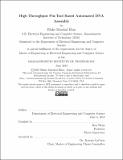High throughput pin-tool based automated DNA assembly
Author(s)
Elias, Blake Marshal
DownloadFull printable version (8.158Mb)
Other Contributors
Massachusetts Institute of Technology. Department of Electrical Engineering and Computer Science.
Advisor
Ron Weiss.
Terms of use
Metadata
Show full item recordAbstract
Synthetic biology is the artificial design and engineering of biological systems and living organisms, drawing from disciplines such as biological and electrical engineering, computer science, biology and chemistry. Experimental work in synthetic biology is enabled by molecular biology techniques such as DNA assembly and molecular cloning. Researchers currently perform these techniques manually in wet-labs, which is expensive, time-consuming, requires extensive training and is unreliable. This thesis demonstrates a working robotic automation system that lowers the monetary- and time-cost of performing synthetic biology experiments, reduces the volume of Golden Gate DNA Assembly reactions by an order of magnitude using pin tools for small-volume liquid transfer, and which has successfully built 130 new genetic constructs using 192 genetic parts submitted by 11 researchers for both bacterial and mammalian systems. This thesis also presents a model which uses data on past assembly success to predict the outcome of reactions that the model had not seen. This model generates two sub-libraries of validated parts: one containing 79 parts (41% of those submitted) with a predicted assembly success rate of 90% or greater, the other with 28 parts (15% of those submitted) and 99% or greater predicted success, when using parts exclusively within each of the respective libraries.
Description
Thesis: M. Eng., Massachusetts Institute of Technology, Department of Electrical Engineering and Computer Science, 2018. This electronic version was submitted by the student author. The certified thesis is available in the Institute Archives and Special Collections. Cataloged from student-submitted PDF version of thesis. Includes bibliographical references (pages 129-132).
Date issued
2018Department
Massachusetts Institute of Technology. Department of Electrical Engineering and Computer SciencePublisher
Massachusetts Institute of Technology
Keywords
Electrical Engineering and Computer Science.